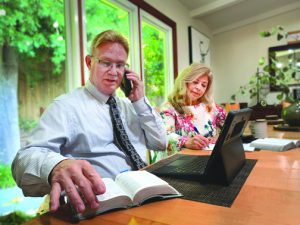
Photo provided by Braden VILLANUEVA
It’s been one year since Jehovah’s Witnesses adjusted their hallmark methods of sharing comfort and hope from the Scriptures due to the pandemic. For many, the change from ringing doorbells and knocking on doors to making phone calls and writing letters expanded and invigorated their ministry.
Brian Portzel and his family in La Crescenta have enjoyed writing letters and calling their neighbors during the pandemic. Noting the positive impact virtual meetings have had on the local congregation of Jehovah’s Witnesses, Brian commented, “attendance has grown” and those who are housebound or disabled have “an opportunity to enjoy the ministry” and meetings more fully.
In March 2020, Witnesses in the United States suspended their door-to-door and face-to-face forms of public ministry and moved congregation meetings to videoconferencing.
“It has been a very deliberate decision based on our respect for life and love of neighbor,” said Robert Hendriks, U.S. spokesman for Jehovah’s Witnesses. “But we are still witnesses, so we must testify about our faith. It was inevitable that we would find a way to continue our work.”
Many have checked in on neighbors as well as distant friends and family –sometimes sharing links to Bible-based articles from the organization’s official website, jw.org, on timely topics such as isolation, depression and beating pandemic fatigue.
If anything, the pandemic has heightened Witnesses’ concern for others, said Hendriks.
“We are finding that people are perplexed, stressed and feeling isolated. Our work has helped many regain a sense of footing – even normalcy – at a very unsettled time,” he said.
Witnesses’ virtual meeting attendance is up, but the most significant gains don’t have numbers, said Tony Fowler, who helps organize the ministry in part of Michigan.
“We’ve grown in appreciation for other avenues of the ministry, our love for our neighbor, and love for one another. We’re a stronger people because of all of this,” Fowler said.
